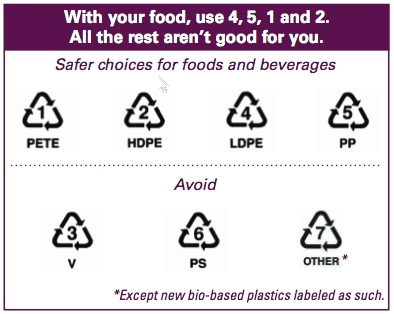|
|
|
from NaturalNews Website
The CDC estimates that over 90% of people in the U.S. are chronically exposed to BPA at over 3000 times the daily level that the FDA reports.
Maybe this monstrous difference comes from the fact that the FDA standards ignored more than 100 credible research experiments and studies other than their own.
The new FDA regulatory language offers to seek,
...but industry lobbyists argue about
"safe levels" and do their best to muddy those waters in order to
keep the profits margins maximized.
The FDA and the
CDC use the rationale that what kills rats in labs may not have the
same effect on humans, but this time, hundreds of tests done on
humans reveal otherwise.
The number 2 means your food is contaminated by
aluminum and polyethylene plastic, and the number 7 means there is
BPA in your polycarbonate container.
To make things worse, if the bottles or cans have been sitting on the shelf at the grocery for months, the toxic levels of BPA are higher, and since there's no "born-on date," like beer might have, there's no telling the age of the container.
Also, if the plastic gets heated up, like in a car, more toxins are released into the drink. Plus, canned goods are sterilized at up to 265% Fahrenheit, so the level of BPA released in those foods is horrendous, not to mention the fact that all of the nutrients at that temperature have been depleted from the source.
Metal cans have no warning or
indicator whatsoever about BPA.
...and the other "preservative" criminals.
Wondering why kids are more hyperactive these days and the doctors suggest prescribing ADHD pharmaceuticals? Bisphenol-A mimics estrogenic activity and enhances mesolimbic dopamine activity, which results in hyperactivity and attention deficits.
Still have canned sodas on your grocery list?
By the way, it's also in
your dental fillings.
Remember, an advertisement's slogan is
often a cover up for the product's greatest weakness.
Poisoning Us from NaturalNews Website
The Breast Cancer Fund recently tested 12 brand name canned soup and pasta products and found Bisphenol A, or BPA, in all of them.
BPA is a hormone-mimicking toxin that
also has recently been found to impact our DNA and to kill off
female ovarian cells in a way that may cause Down Syndrome and
fertility problems in future generations. While BPA shouldn't be in
any of us, children are thought to be the most susceptible and the
soups and pastas tested were marketed toward children.
A few months ago, the FDA also found BPA
in 71 of 78 canned goods they tested. The FDA also tested different
types of foods, including canned tuna and vegetables, and in these
foods they found much higher levels of BPA - ranging from 300 ppb to
more than 700 parts per billion.
They fed these mice food laced with a little BPA each day and found that with chronic dietary exposure, the animals exhibited,
Then Rosenfeld tells us that there's no
reason to expect the human body would respond any differently.
[Editor's Note:
NaturalNews is strongly against the use of all forms of animal
testing. We fully support implementation of humane medical
experimentation that promotes the health and wellbeing of all living
creatures.]
|


